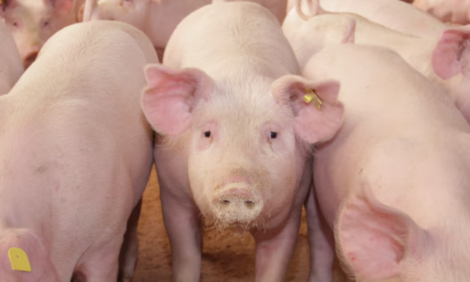



Balancing Pig Welfare, Castration and Boar Taint
The welfare of pigs and the question of whether they should be castrated have caused controversy across Europe, writes ThePigSite senior editor, Chris Harris.In the UK, for welfare reasons pigs are not castrated, but in Germany most retailers will not accept boar meat.
The major concern surrounds the possibility of boar taint in the meat from non-castrated pigs.
For the UK, the possibility of boar taint ruining the taste of the meat is lessened because slaughter weights at around 75kg-76kg are much less than in other parts of Europe. In the Netherlands, for example average slaughter weights can be 91 kg.
A spokesman for the British Pig Executive said: "It is one of the things that distinguishes us from the rest of Europe.
"We don't take our pigs to such high carcase weights as some other parts of Europe, therefore we do not get boar taint in the same sort of proportion.
"We don't get the problem and we also get a better feed conversion rate."
In the New Year the European Commission will be issuing a research contract, worth up to €1 million for a study into alternatives to the castration of pigs and dehorning of cattle.
At present the improvement of animal health and welfare met by several EU policies and is also addressed by international organisations such as the World Organisation for Animal Health or Office International des Epizooties (OIE), the Food and Agriculture Organisation (FAO) and the World Health Organisation (WHO).
The new research follows the policies laid down in the Community Action Plan on the Protection and Welfare of Animals 2006-2010.
The Commission says: "There is a growing support for the development of more welfare-orientated production systems and, as a corollary, the Commission finds itself in the position of assessing welfare when formulating policies.
"There is a need, therefore, to ensure that there are solid scientific data available to underpin policy development. With new farming systems being developed, there is a need for the adaptation of animal husbandry techniques."
Study for Alternative Methods
The Commission has set out in Directive 91/630/EEC minimum standards for the protection of pigs in which it 2 allows for the castration of male pigs by other means than tearing of tissues.
"Surgical castration is often carried out without anaesthesia and by a variety of personnel, and this raises concerns about the welfare of the animals," the Commission says.
"Therefore the Commission intends to award a contract for a scientific study focusing on alternatives on the surgical castration of pigs and on dehorning of cattle.
"The study could produce valuable information on pig castration and on dehorning of cattle that will support EU policies in reducing painful procedures and facilitate alternative solutions."
The guidance notes to the contact tender say: "There is a growing support for the development of more welfare-orientated production systems to ensure that there are solid scientific data available to underpin policy development.
"The pilot project concerning pig castration should complement ongoing research on castration and focus on its practical consequences by developing a program establishing a European harmonised method to detect boar taint at the slaughter line under commercial conditions and to assess the commercial aspects of marketing meat from non castrated animals in Europe.
"The development of such methods will encourage farmers to raise uncastrated animals and establish reliable and consistent data for further development of different alternatives to surgical castration."
The project falls within the remit of the Sixth Framework Programme for RTD the European Commission is funding a scientific research project on piglet castration - PIGCAS "Attitudes, practices and state of the art regarding piglet castration in Europe", which started in January 2007 and which is to provide information that will support EU policy on the welfare implications of surgical castration in pigs.
The Commission has been directed to present a report that takes into account the development of techniques and systems of pig production and meat processing, which would be likely to reduce the need for surgical castration.
"Consideration should also be given to possible means of reducing the poor welfare implications of castration by, for example, improving castration methods, using techniques other than surgical castration and /or alternative management practices to reduce the risk of boar taint in the meat," the Commission says.
"In the project the current practices have to be reviewed concerning the castration of male and female piglets in the EU in order to determine the extent of the practice of castration of piglets within the EU and the conditions under which castration is performed:
- alternatives to the surgical castration of pigs should be developed and promoted;
- methods should be developed to detect boar taint on the slaughter line; analytical parameters should be determined and an objective measurement for the quality should be developed;
- methods should be developed to reduce the boar taint at meat processing.
- a survey should be carried out on the demand and acceptance of consumers."
The Danish Position
Already some of the major pig producing countries are reassessing their current practices regarding pig castration.
The Danish pig meat industry is currently researching different methods of ensuring castration is carried out in the most humane way.
"Meat from castrated male pigs has been a requirement from a significant number of customers in different markets across the world supplied by the Danish industry, in order to minimise the risk of 'boar taint'," the Danish Meat and Bacon Council says.
"However, the castration of male piglets is to the economic disadvantage of pig producers, due to the resulting slower growth rates and a lower lean meat content (on which payment is based) in the finished carcase.
"Castration is usually carried out in the first few days of the piglet's life. If the operation is performed after seven days, Danish legislation currently requires that it must take place under anaesthetic. Although the operation inevitably causes some temporary distress to the piglet, it can be carried out quickly and hygienically by a stockman who has received proper training.
"During the 1990s, the Danish meat industry made a major investment in the development of an 'on-line' system at the abattoir to test for 'boar taint', linked to the level of 'skatole' detected in carcases of 'entire' male pigs. However, the system was not accepted by the German authorities.
"In recent years, the Danish industry has been involved in research to examine alternatives to the surgical castration of male pigs, such as the use of different breeding and feeding approaches during production. It recently embarked on a project to evaluate the use of special vaccines to suppress the development of male hormones.
"In July 2008, the Danish Animal Welfare Council recommended to Justice Minister Lene Espersen that, from 1 January 2010, it should be compulsory for piglets to be given pain relief for castration, rather than anesthesia prior to castration.The Danish pig industry is now co-operating with the authorities in finding effective pain relieving strategies to be implemented during production.
"In the longer term, the Danish industry has now committed its producers to phasing out the castration of male piglets and to employ alternative strategies to eliminate the risk of 'boar taint'. This process will also involve work to achieve solutions which are accepted on an EU-wide basis."
Migros Chooses Gas Anaesthesia
Switzerland currently castrates 1.3 million piglets a year without anaesthetic, but this will change on January 1, 2010 when the law will change, requiring painless procedures.
The Swiss vets' association Société des Vétérinaires suisses (SVS) has once again described surgical castration as "outmoded" in a statement issued early in December.
It is calling on its members not to use or supply Isoflurane used for this procedure, citing doubts expressed by pharmaceutical approvals agency Swissmedic.
"Given that vaccination has been tested and approved as a sure method of preventing boar taint in meat production, one could and one should renounce a procedure as violent as surgical castration," SVS declared.
While conceding that there were short term handling advantages, SVS warned that subsequent postoperative pains can only be relieved by administering antalgesics.
In late November Swissmedic revealed that the use of an anaesthia mask required specific medical knowledge, since anaesthesia has risks and is always heavy on the animal. Swissmedic also singles out Isoflurane as a more potent greenhouse gas than carbon dioxide.
Environmental arguments are taken particularly seriously by Switzerland's largest retailer, the co-operative Migros. In addition to more than 700 outlets in Switzerland, the retailer has a small but growing nucleus of French and German stores, where EU approvals must be enforced.
Migros and its meat subsidiary Micarna have jointly decided to opt for gas anaesthesia to castrate piglets surgically, which will be fully operational by1 July 2009, well ahead of the deadline. The procedure will be carried out on farms by visiting veterinary teams, Migros explained.
The choice of gas anaesthesia was one of the quickest options to implement, the other main contender being injections which are at present only authorised for products sold in Switzerland.
The retailer also took advice from the federal veterinary office as to the additional measures that would be needed to reduce the risk of boar taint to an acceptable level among injected male slaughter pigs.
While Migros did carry out a full evaluation the vaccination option over the summer, it did not comment on what options would have been for its outlets in France and Germany had it actually chosen the vaccination route.
VION Foods and the Dutch Position
In the Netherlands, while the legislation did not require anaesthetic to be administered to pigs to be castrated up to five days old, Dutch retailers have helped to finance welfare measures to bring in anaesthetics.
The leading pig processing company Vion has been researching methods of castrating piglets using anaesthesia because of concerns over boar taint and now has fixed on using a procedure with CO2.
"The system has been rolled out across the Netherlands," said Marc van der Lee for Vion.
"It has been agreed with the Dutch breeders and all the breeders do it this way."
Mr van der Lee added that because the retailers were anxious not to have meat on their shelves that might have been affected by boar taint, Vion had managed to get them to pay for part of the process.
"The retailers are going to pay an amount per kilo of product to castrate the piglets using CO2," he said.
He added that what has been achieved in the Netherlands in the way of castration with anaesthesia has been a step in the research to end castration altogether.
"We want to stop it, but it has got to be through research on a European level," said Mr van der Lee.
"We would urge everyone to make it an issue of research at a European level but it is a difficult issue, because you have got to get rid of boar taint as well.
"Millions and millions of euros have already been spent on how to prevent boar taint."
He said that the answer could lie through research in genetics or in feed or there could be some end of line procedure in the slaughterhouse, but it needed a concerted effort from the industry to end castration of piglets and also ensure meat is produced without boar taint.
December 2008






